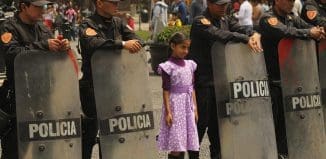Original Approach to Police Anti-Terror Efforts
This post is also available in:  עברית (Hebrew)
עברית (Hebrew)
The Australian police have been trying to target would-be extremists before they conduct a terrorist attack, with the formation of the Fixated Persons Investigations Unit, a team of 15 detectives and mental health specialists who will investigate people vulnerable to Islamic State-style propaganda and violence including calls for lone-wolf-style attacks.
About 10 mentally ill or vulnerable Australians who could become perpetrators of Islamic State-inspired violence have been identified as part of this policy.
According to theaustralian.com, the unit is one of a series of measures being trialed or rolled out across the state, focusing police resources on the increasing nexus between mental illness and Islamic State-inspired violence. The initiative draws heavily on a program that has been running successfully in Queensland.
The unit would include in its focus individuals who had a history of obsessing over particular people or institutions, who might be mentally ill and who have had low-level dealings with police.
The newly appointed NSW Police Commissioner Mick Fuller made it clear the initiatives were about identifying potential threats to the community that were not readily detected by existing methods. “I’m not saying I can stop every lone wolf; what I’m saying is there’s a big group of people out there who are potentially dangerous and potentially slipping through the net,’’ he said.
The unit comes months after police in southwestern Sydney quietly rolled out Operational Sentinel, a trial program run at the local-area-command level and aimed at identifying local people of concern.
Operational Sentinel is understood to have been running for about four months across four commands and is believed to have identified nine persons of interest, all of whom will now be subject to a detailed risk assessment by the Fixated Persons Investigations Unit.
Whereas Operational Sentinel draws on local intelligence to identify potential threats, the new unit will have access to a suspect’s medical information via the Department of Health.
The unit will be staffed by 15 detectives as well as staff from NSW Police’s mental health unit.
The idea is for police to build a profile of a person’s mental state and propensity for violence and then to act — either with a mental health crisis team or police — before they commit a crime.
The relationship between extremism and mental illness is controversial, with some arguing the focus on mental health excuses or plays down Islamic State’s culpability in encouraging lethal attacks.
Fuller said police needed to address the issue. “Counter-terrorism units around the world don’t like linking mental health to terrorists and I totally understand,’’ he said. ‘’But I think we’ve got to be courageous enough to say some of these people have got significant mental health issues.’’






























